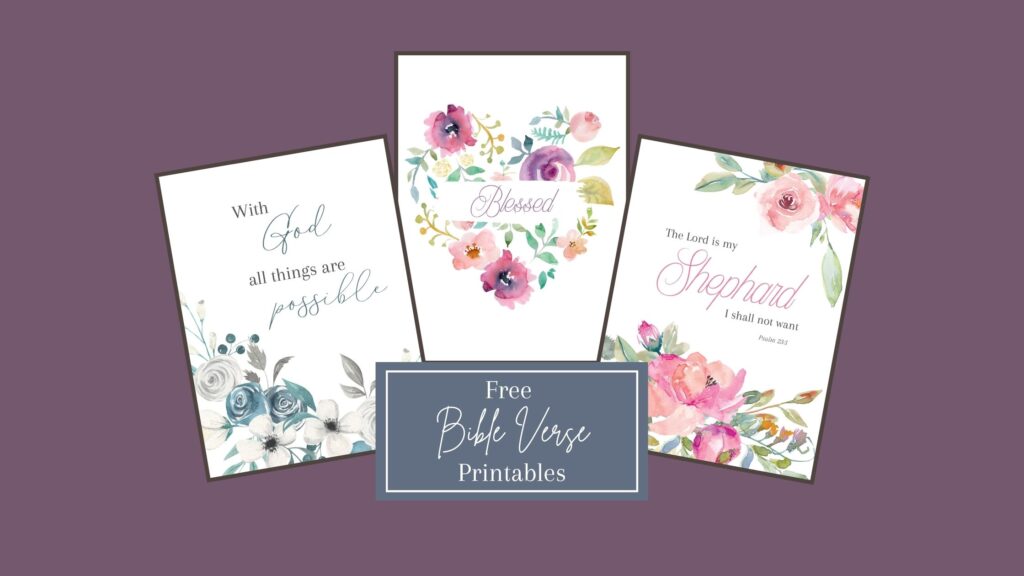If you are leading a Bible study for a small group (or large group) or in an online environment, you’ll definitely want to use some Bible study ice breakers to kick off your study!
Icebreaker questions can be a powerful tool for increasing engagement in Bible study groups by creating a relaxed and inclusive atmosphere.
These questions are designed to break the ice, encourage interaction, and foster a sense of community among the participants.
When used effectively in a Bible study setting, icebreakers can help people feel more comfortable sharing their thoughts and insights, leading to a more enriching and interactive study experience.
Bible study Icebreakers are an easy way to help spark conversation and help everyone find common ground and get to know each other a little better.
Icebreakers can be especially helpful in integrating new members into an existing Bible study group. Fun and interactive icebreaker activities can quickly make newcomers feel like they belong and encourage them to participate.
They can also help in youth group environments because kids can often be shy about interacting when they don’t know the other participants.
Bible study icebreakers can help get the group to actually engage with the topic (which helps them understand it more).

This post may contain affiliate links, please see our full disclosure for more information.
How to Use Bible Study Icebreakers
Using Bible study icebreaker questions involves integrating them strategically into the beginning of your study sessions.
How you use these icebreakers will vary somewhat depending on whether you are meeting in-person, in a Facebook group, on social media, or during a live virtual study. But here are some basic guidelines you can use to help make your study go well.
- Prepare in advance: The first thing you need to do is prepare! To help keep everything running smoothly, have your questions prepared in advance. This should include a combination of general questions (to help participants relax and get to know each other) as well as biblical questions relevant to the study you will be doing.
- Set the tone: Since many participants may not know each other, it is important to set the tone by introducing your self and letting everyone know to have fun!
- Introduce the icebreaker: Present the icebreaker question to the group. You can display it on a screen or write it on a whiteboard, or simply verbalize the question. You can even print them on a piece of paper so group members can have them to hold onto. Encourage participants to take a few moments to think about their answers.
- Encourage participation: Invite participants to take turns sharing their responses to the icebreaker question. Encourage active listening and positive reinforcement as individuals share their thoughts. Make sure to model engaged listening yourself.
- Relate to the Bible study topic: If possible, choose icebreaker questions that relate to the main theme or passage of the Bible study. This will help transition smoothly into the study and show the relevance of the icebreaker to the subsequent discussion.
- Use open-ended questions: Opt for open-ended questions that require more than a simple yes or no answer. These questions encourage deeper thinking and can lead to more meaningful discussions.
- Respect individual comfort levels: Be mindful that some participants may be more reserved or introverted. If someone doesn’t want to share their answer, don’t pressure them. Always create a safe and non-judgmental space for everyone.
- Moderate the time: Be conscious of time constraints and the overall length of the icebreaker segment. Aim for a balance between allowing ample participation while ensuring enough time remains for the Bible study itself.
- Transition smoothly: After the icebreaker activity, gently transition into the main Bible study topic or passage. If the icebreaker question was related to the study topic, use it as a segue to introduce the upcoming discussion.
- Reflect on the icebreaker: At the end of the study session or during the wrap-up, briefly discuss the impact of the icebreaker questions. Ask participants how they felt about the activity and if they found it beneficial to the overall study experience.
Remember that icebreaker games are meant to be fun and engaging while fostering a sense of community. They should, however, complement the Bible study and not detract from its purpose.
With thoughtful selection and facilitation, Bible study icebreaker questions can contribute to a more enriching and interactive study environment.
And the best thing is that they can be tailored to both in-person and online study environments!
Bible Study Icebreakers for Facebook Groups
Bible study icebreakers are a great way to spur conversation – especially in an online Bible study environment.
When people meet in person, the attendees will naturally start talking to the person next to them. But icebreakers are important to engage those who might be a little shy or reserved.
But, in an online environment, icebreakers are even more important because you have a group of people who (mostly) don’t know each other and are simply in a FB group or maybe on a video call.
In these situations, people are more reserved because
- They don’t know each other.
- They feel more like they are in a classroom where they should wait to be “called” on.
Since a Facebook Bible study group is more of a passive study delivery, it can be a bit more difficult to get the members to actually engage.
Many of us follow lots of different groups or pages and our feed can easily be filled with content. In general, most people in your group will probably “like” a post but don’t regularly comment on them.
Getting them to comment is key because that shows they are actually stopping to reflect on whatever the post was about.
General FB Group Icebreakers
When you are not actively doing a specific study, it is important to keep the group engaging with each other.
New Member Welcome: You should post regular Icebreaker posts in your FB Bible study group to welcome new members. If you are consistently adding new members, consider doing a weekly “Welcome to the Group” icebreaker post.
This could be as simple as adding a graphic that says “Welcome! Please introduce yourself! Tell us your name, where you live, and anything you’d like to share about yourself.”
Weekly Engagement Topics: These could be things like sharing a verse and asking the group what that verse means to them or how they can apply it to their life.
You could even create icebreaker posts just to get them talking. I love the “this or that” type of posts. Basically, you just write “Dogs or Cats? And why?” or “Coffee or Tea?” Just give them 2 options within a category and ask their preference. This has nothing to do with Bible study but is just a fun way to get them to engage.
Another fun one where you ask the group to share fun facts about themselves. Just begin with “What is your favorite XXXX?” You can put anything in the blank:
- favorite book
- favorite dessert
- favorite season
- favorite food
- favorite tv show
- favorite movie (or Christian movie)
- favorite thing
This type of icebreaker gets people sharing and helps members with common interests connect.
You could also include what I call “Christian” Icebreakers. These would be faith-inspired questions such as “Did you grow up in church?” or “What is your biggest struggle with reading the Bible?” All of these types of questions have something to do with the Bible or being a Christian.
FB Group Study-Related Icebreakers
When you kick off a new study in your Facebook group, you can use Bible study icebreakers to get the members to engage with the actual study materials.
These questions should directly relate to or tie into the new study topic.
For example, if you were kicking off a study about Naomi, you could use an icebreaker such as “How can bitterness keep you from receiving God’s many blessings?”
If you are delivering your study over the course of several weeks in the group, think of a couple of questions like this specific to each week’s study materials.

Zoom Bible Study Icebreakers
Icebreakers during a live virtual Bible study event can be a bit more challenging – especially if the group is large. This type of event has a time limit and you want attendees to get the most out of that time.
In this scenario, I wouldn’t worry about “get to know each other” types of icebreakers because you just won’t have the time to do them.
During a live Bible study event, it will be more about you delivering the material. However, you do want to provide ways for the attendees to engage.
Before you dive into the actual study, you could begin with a few Bible study icebreaker questions and ask attendees to comment in the chat with the answers.
As for the type of icebreaker questions to ask, you can use the same types of questions as in the Facebook group (remember the bitterness question?).

Bible Study Ice Breaker Questions
Aside from the “get to know each other” ice breaker questions, you’ll want to ensure you have plenty of fun icebreaker questions that directly tie into the lesson you are studying together.
So, what types of Bible study questions should you ask? That depends on how creative you want to get!
You could ask a question related to an interesting fact about the main character or time period of the study. You could ask a question about a certain well-known family member of the main character.
Questions related to the study should, of course be done at the start of the meeting – before diving into the study. But also, in-depth Bible study can be mentally challenging. Icebreakers provide a break from intense discussion, allowing participants to relax, have fun, and recharge before diving back into the study.
These are just a few simple questions you could ask. Again, just get creative with it!
The best piece of advice I can offer is to ensure they are appropriate for the age group of the participants! But aside from that, they should be fun and engaging!
Be sure to check out this list of free printable Bible study worksheets to take an even deeper dive into your Bible study time! And if you love using an Ipad, be sure to also check out these digital Bible study journals!
Bible Study Icebreaker Resources
There are a lot of places to find ideas for Christian icebreakers for your Bible study groups. Some are meant for in-person events but can be tailored to an online environment.
Below are some other websites where you can find more icebreakers for your Bible study groups.
Icebreakers can make a Bible study group more fun by infusing a sense of enjoyment, camaraderie, and lightheartedness into the study sessions.
Remember that the key to using icebreakers effectively is to strike a balance between fun and the serious study of the Bible.
While icebreakers can add enjoyment and create a positive atmosphere, they should always complement the primary purpose of studying God’s word and deepen the understanding and application of biblical principles.
Be sure to check out some of our other group Bible study resources:




